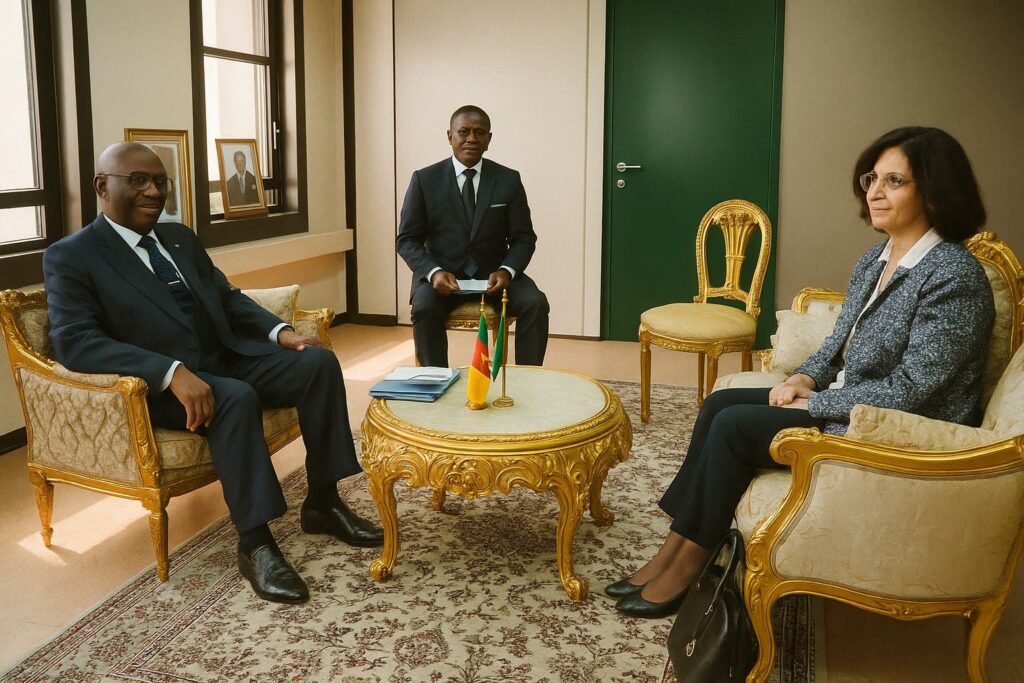A Convergence of Nautical Agendas
The discreet yet symbolically weighty encounter held on 1 July in Brazzaville between Éric Olivier Sébastien Dibas-Franck, secretary-general of Congo’s Inter-ministerial Committee on State Action at Sea and Inland Waters, and Egypt’s ambassador Imane Samy Yakout unfolded against a backdrop of rising geopolitical attention to African maritime spaces. While the rendez-vous lasted less than an hour, both diplomats emerged with an unmistakable sense of urgency. “We expect to seal a memorandum on maritime security in the near future,” the ambassador underlined, her comment hinting at the political will in Cairo to transcend customary diplomatic courtesies. The declaration dovetails perfectly with the 6 June validation of Brazzaville’s National Strategy for the Sea and Inland Waters, a roadmap that elevates maritime governance to a national priority.
Egypt’s Strategic Know-How and Regional Clout
Egypt’s maritime pedigree is incontestable. Straddling the Suez Canal, a corridor through which roughly twelve percent of global trade transits, Cairo has mastered port security, vessel-traffic management and coastal surveillance (International Maritime Organization, 2023). Moreover, Egypt hosts a regional office of the IMO in Alexandria, giving its naval technocrats privileged access to regulatory updates and best practices. This institutional capital is what Brazzaville now seeks to import—not as passive recipient but as co-architect of a shared security perimeter extending from the Red Sea to the Atlantic. In diplomatic terms, the putative memorandum would render Congo a gateway for Egyptian expertise into the Gulf of Guinea, an area that remains classified as a high-risk zone for maritime crime despite a recorded forty-six percent drop in piracy incidents last year (IMB, 2023).
Brazzaville’s Emerging Maritime Architecture
For Congo-Brazzaville, historically focused on fluvial navigation along the Congo River, the turn toward oceanic affairs represents an ambitious recalibration of its strategic compass. The newly endorsed national strategy articulates three axes: safeguarding sovereignty, stimulating blue-growth sectors and integrating environmental stewardship. « The seas constitute our next frontier of development, » Mr. Dibas-Franck told visiting journalists, underscoring a doctrinal shift framed by President Denis Sassou Nguesso’s broader Vision 2025. Concrete measures include the upgrading of Pointe-Noire’s port-control center, the deployment of coastal radar chains and the infusion of legal reforms aligned with the Yaoundé Code of Conduct, the 2013 regional instrument that institutionalised information-sharing in the Gulf of Guinea.
Shared Stakes in Combating Transnational Crime
While the Gulf of Guinea and the Red Sea are separated by thousands of nautical miles, they increasingly share convergent security challenges: illicit bunkering, arms trafficking, unlicensed fishing and cyber intrusion into port logistics. The United Nations Office on Drugs and Crime estimates that illegal fisheries alone siphon up to 1.5 billion dollars annually from West and Central African littorals (UNODC, 2023). Egypt’s coastguard already deploys an integrated maritime domain awareness system that fuses satellite imagery with automatic identification data—capabilities that Congolese planners are eager to embed into their nascent Maritime Operations Center in Brazzaville. Diplomats argue that a bilateral accord could serve as a confidence-building device that nudges other Gulf of Guinea states to synchronise efforts, thereby amplifying the impact of multilateral frameworks such as the G-7++ Friends of the Gulf of Guinea.
Soft Diplomacy and Prospective Economic Dividends
Beyond the security calculus, the prospective memorandum resonates with the development narrative advocated in the African Union’s 2050 Africa’s Integrated Maritime Strategy, which positions the blue economy as a driver of continental transformation. Egypt’s state-owned Suez Canal Economic Zone has evolved into a case study in cluster-based industrialisation; its lessons on public-private governance and green-port financing may inform Congo’s plan to modernise the Special Economic Zone of Pointe-Noire. According to the African Development Bank, even a modest two-percent increase in maritime trade efficiency could inject an additional 450 million dollars into Congo’s GDP over five years. Such projections explain the measured optimism of Ambassador Yakout who, off record, observed that “economic diplomacy often sails faster than gunboat diplomacy.” In a region where symbolism can lubricate commerce, the sight of an Egyptian training vessel moored in Pointe-Noire during forthcoming joint exercises would carry undeniable soft-power weight.
Looking Ahead to a Multilayered Partnership
Negotiators still have work to do: drafting clauses on rules of engagement, information classification and capacity-building timelines. Yet the political scaffolding appears sturdy. The Congo’s Parliament is expected to scrutinise the national maritime strategy during its autumn session, a procedural hurdle likely to catalyse rather than hinder the memorandum’s ratification. For Cairo, the accord offers a tangible avenue to deepen its African footprint south of the Sahel while reinforcing its credentials as a security provider rather than a mere transit hub. Observers in both capitals note that the timing also aligns with the African Continental Free Trade Area’s gradual reduction of non-tariff barriers, a dynamic that will magnify the strategic premium of safe sea lanes. Should the document be signed before year’s end, it would signal a maturation of south-south cooperation premised on pragmatism rather than rhetoric. In the words of a senior Congolese diplomat, “A stable sea is the quiet diplomat of prosperous nations.”

